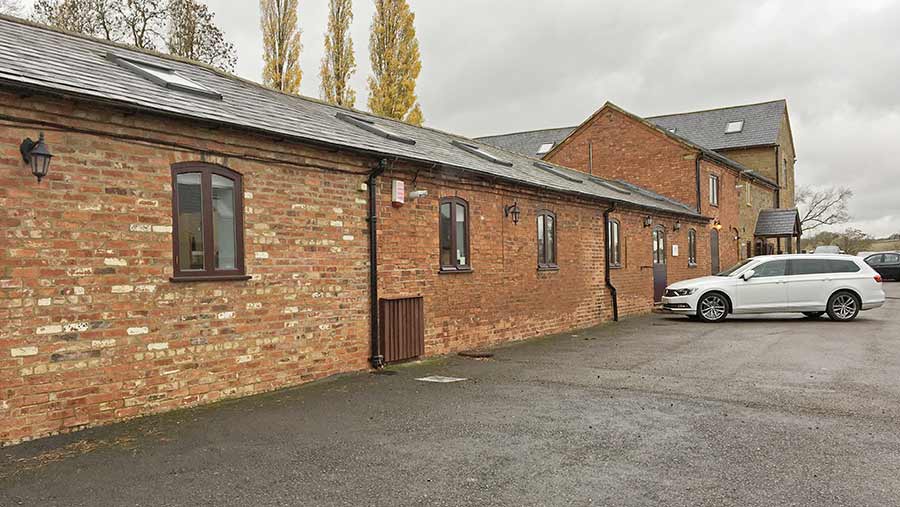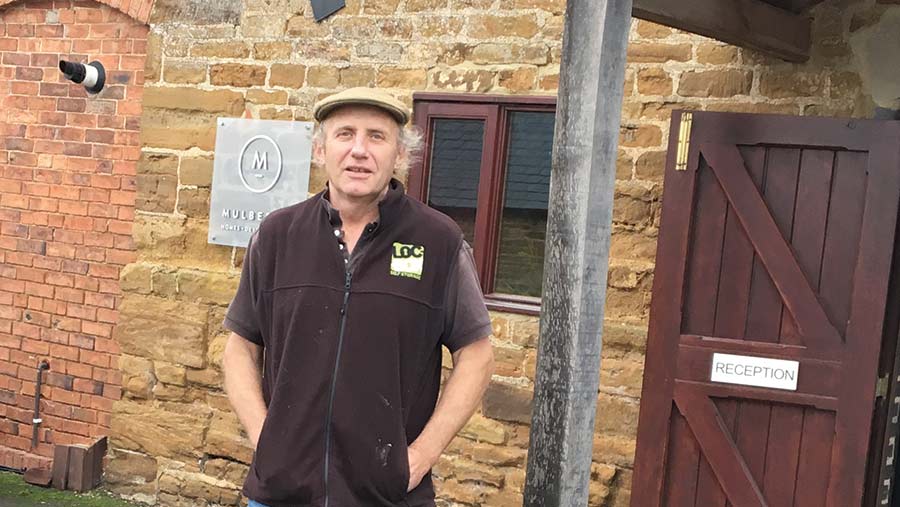So you want to….rent out office and workshop space

Farm offices
Letting buildings for non-farming uses is the most popular form of farm diversification.
Conversion of former farm buildings to offices and workshops brings additional income to farms, it can reduce business risk and also help sustain rural communities, bringing in economic activity and providing local jobs.
Advisers warn that market research is the foundation of a good business plan, so time spent on this will help ensure decisions are made on a solid footing.
They also say that farm-based landlords for this type of letting often see lower tenant turnover than town centre and industrial estate settings.
What is the market for letting buildings?
There is a wide variation in conditions between regions and between areas within regions. Many advisers caution not to spend any money on conversion until a tenant is waiting to move in.
While some office tenants will not want to stray far from town, others will pay a premium for certain rural offerings, but these need to be high-spec and well-serviced.
Good market research is a must. A quick search of what is advertised locally and a few inquiries about how long space has been available will give a good indication of supply and demand and a guide to rental values.
See also: How to avoid the tax traps of farm diversification
Consider the standard of what is on offer and why it may not have been snapped up.
It’s also a good idea to research further afield, in an area where you will not be competing, visiting farmers who have gone into this market to get their advice.
Do I need planning permission?
A change of use application will be needed from agricultural to B1 commercial/light industrial use, along with building regulations for any structural work.
Planning permission for most straightforward farm building conversion schemes will take about eight weeks to achieve, with highways, access and parking the most likely challenges in planning terms.
What are the essential requirements?
Good access, parking, and high-speed broadband are generally essential, although a small proportion of workshop tenants simply want a weatherproof building that meets health and safety requirements and has basic services such as electricity and water.
For example, a Cumbrian barn-to-workshop conversion suited both landlord and tenant, says Craig Brough of H&H Land and Property.
The stone barn needed to be made wind- and watertight to preserve it and the addition of heating offered the car restorer tenant a larger, more agreeable space at a cheaper rent than on an industrial estate and a better setting for his business.
How much should we charge?
Rents vary enormously between region and depending on the standard of the building, but a guide for rural office rents is from £8-£20/sq ft and for workshops £3-£7/sq ft a year.
As long as conversion costs are kept reasonable in line with the expected market, buildings that are likely to have been redundant for farming purposes will be earning an income.
What are the legal considerations?
Avoid licences and or ad-hoc informal arrangements. Use a formal agreement that makes the obligations of each party clear.
Avoid creating security of tenure – in order to achieve this the lease needs to contract out of certain provisions of the Landlord and Tenant Act 1954, and the correct procedure for doing so must be followed.
Lawyers and insurers also advise that landlords need to be clear about the activities of tenants, especially where those activities carry a particular risk, such as car paint spraying, gas cylinder storage, or where they are subject to waste regulations requiring disposal at particular intervals.
What about tax and accounting?
As with most diversifications, there are likely to be capital, income and value-added tax implications. Taking a building out of agricultural use will remove it from the scope of the valuable agricultural property relief (APR) from inheritance tax, although business property relief may be available.
Diversifications can grow quickly and if rental income exceeds 50% of overall income, this can jeopardise APR on the remaining agricultural element of the assets, as income from the let buildings will be considered non-trading income.
Take advice on whether the new venture should be run as a separate business with its own VAT number.
What about insurance?
Inform your insurer or broker of any new activity – the farm policy covers only farming. Knowing what activities tenants are undertaking is important, as this may have buildings and public liability insurance implications.
In general, the landlord insures the fabric of the building and any landlord’s fixtures and fittings, while tenants insure their own equipment and any stock or product.
Fire is one of the most common causes of claims involving farm diversification activities, while slips, trips and falls by members of the public or visitors to tenants’ businesses are also common.
If the let buildings are in a working farmyard then practices may need to be reviewed to minimise risk.
Are there any grants for this type of venture?
Yes, many conversions to offices and workshops have had grant aid of up to 40% through local Leader funding initiatives and other rural development programmes.
Almost all grant schemes are competitive, applications must meet certain criteria (which may vary regionally) and need a good business plan to support them.
Broadband grants are available in some regions.
Business rates
An office or workshop may be liable for business rates, although the small business rates relief scheme offers a reduced rate on qualifying properties, which may make them more affordable to rent.
Letting tips
- Be flexible – convert or design buildings with tenant expansion in mind
- Visit other farms further afield that are already in this market to hear their experiences and tips
- Line up tenants before starting conversion
- Live up to your promises – if you’re offering high-speed broadband, make sure it delivers
- Use direct debit and standing orders – avoid cheques and cash
- Know what activities tenants are carrying out
- Tell insurers what’s happening
- Avoid informal arrangements
Case study – Twigden Barns and Matts Lodge Farm

John Matts
At Creaton in Northamptonshire, the Matts family has up to 28 office and workshop units on two sites within its arable and sheep operations.
The venture began 17 years ago and the longest-serving tenant has been on the site since then, says John Matts, who manages the lettings.
Despite lots of local competition, the units are fully let, with a low turnover. Tenants include a property developer, an architect, an engineering company, a fabricator, a sign manufacturer, a tree surgeon and a soil tester.
Plus points include good road links, plenty of onsite parking, good broadband speed, secure gated access, alarms and CCTV, as well as an employee living on site.
Local users are encouraged as far as possible, so that those renting the units live within five miles.
As jobs have been lost in farming, the Matts family has been keen to see these compensated for by the creation of employment in the let units, including those for local apprentices.
All rents are paid by standing order or direct debit. High-speed broadband is available alongside three-phase electricity.
Mr Matts’ main advice for others considering this sector is:
- Attend to anything that is your responsibility as a landlord straight away.
- Interview tenants and get a feel for their character and approach.
- Don’t let a single tenant become too important – the Matts operation has a 20% limit in terms of space or as a proportion of rental income.
- Don’t let debt mount up – tackle problems as soon as you become aware of them.
Benefits rural lettings can offer tenants
Land agent Whirledge & Nott operates in Essex and the surrounding counties and says the market is buoyant, but more fluid than it used to be.
As a result, flexibility in lease terms is important. There may be an initial fixed term, but tenants appreciate a break clause thereafter, although they rarely use it, says the firm’s Anthony Hicks.
Once tenants have settled in a rural office or workshop, they tend to stay and prefer it to an industrial estate setting.
Rural spaces tend to offer better transport links, better (and free) parking, as well as lower rent and business rates than the alternatives, he says.
The landlords of rural properties also tend to be a bit more flexible.
Mr Hicks stresses the importance of the correct type of lease, including a forfeiture clause allowing possession to be regained on non-payment of rent and a clause that prohibits sub-letting.
Landlords should be responsible for communal areas, including fire risk assessment, and need to know where any asbestos is and have a management plan for it, says Mr Hicks.
